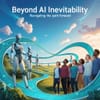The rapid development of artificial intelligence has sparked intense debate about its potential impact on society. Tristan Harris, co-founder of the Center for Humane Technology, warns that we're already sliding down the path of AI chaos and dystopia, losing our footing with every passing day as AI development races ahead without wisdom, restraint, and ethical courage.
The stakes are high, with experts warning that the concentration of power without accountability could lead to disastrous consequences. AI hiring tools can make decisions that developers struggle to explain, leaving candidates unable to understand or challenge outcomes that significantly impact their livelihoods. Similarly, AI credit scoring systems can ingest data from hundreds of sources, including behavioral and unconsented personal data, raising concerns about bias and discrimination.
To mitigate these risks, experts propose essential guideposts for navigating the narrow path forward. These include developing anticipatory AI with human oversight, ensuring seamless integration without surveillance, enhancing human connection rather than replacement, trust-centered design, intent-driven systems, and collective action.
By prioritizing transparency, accountability, and human oversight in AI development, we can create a future where AI enhances human life without sacrificing our values and safety. It's crucial to address the challenges and risks associated with AI adoption, ensuring that the benefits of this technology are realized while minimizing its risks.
Ultimately, the choice is ours. We can continue down the path of AI chaos and dystopia or work together to create a future where technology serves human flourishing rather than exploiting human psychology. The window for change is still open, but it's closing fast. By grasping the lifeline of collective action and navigating the narrow path forward with guideposts like anticipatory AI and trust-centered design, we can ensure a safer, more responsible, and more humane future for all.


